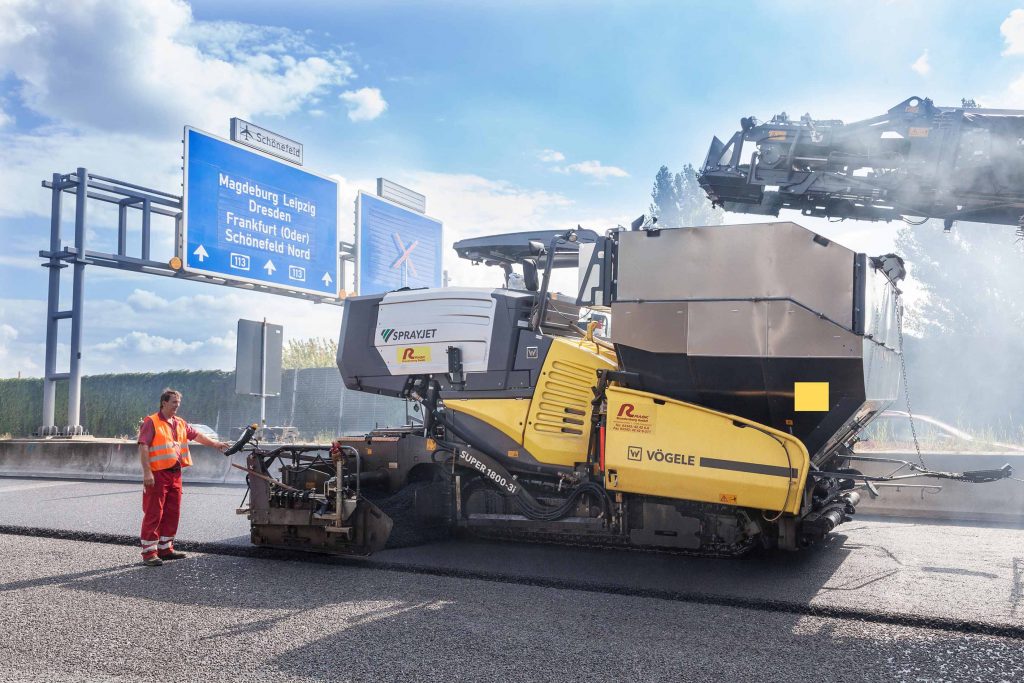In many countries, construction companies are hired to rehabilitate existing roads much more frequently than to build new ones. In addition to the conventional process of milling off the surface and replacing the asphalt pavement, two others exist that are gaining ground worldwide: paving thin overlay on spray seal and the “hot on hot” paving of compact asphalt pavements.
These two methods were made possible by Joseph Vögele AG and their specially developed machine technologies. The world market leader has now combined these two innovations into one. The solution emerged with and for Rask Brandenburg GmbH, a customer that has specialized extensively in modern methods of rehabilitation.
The machines behind these modern methods of road rehabilitation are the SUPER 1800-3i SprayJet paver (for thin overlay) and the VÖGELE InLine Pave train (for compact asphalt pavements). The latter comprises a VÖGELE MT 3000-2i Offset PowerFeeder, a SUPER 2100-3i IP for placing binder course and another VÖGELE paver for the surface course. “With our InLine Pave train and the SUPER 1800-3i SprayJet as the surface course paver, we really have a jack of all trades in our machine fleet,” says Bernd Malcharek, President of Rask Brandenburg GmbH. The combination of leading technologies from VÖGELE gives us maximum flexibility.” The underlying idea is that Rask Brandenburg can take on conventional paving jobs in future, and still be prepared for thin overlay and compact asphalt paving.
Just a few weeks after shipment, the SUPER 1800-3i SprayJet had already clocked 600 operating hours, all of them spent on spray paver jobs, i.e. “hot on hot” jobs using InLine Pave technology. “The future belongs to this process. Construction projects can be completed quickly, and that benefits traffic flows. They are cost-efficient, in part because the step of pre-spraying emulsion is entirely eliminated. And the results are high-quality, because the bond between layers is outstanding,” summarizes Roland Schug, Head of Marketing at VÖGELE.
In the InLine Pave process, the binder and surface courses are paved “hot on hot” in a single pass. In other words, the two VÖGELE pavers work “in line”, with just a few metres between them, so that one lane can remain open to traffic. A VÖGELE MT 3000-2i Offset PowerFeeder with pivoting conveyor and automatic distance control ensures a continuous supply of material. The paver operators can therefore concentrate entirely on paving.
The central technological component of the InLine Pave process is the SUPER 2100-3i IP for placing binder course. Apart from the innovations of the latest “Dash 3” paver generation, this advanced machine has an entirely redesigned transfer module whose heated conveyor system has been extended by 1m. It transfers the mix for the surface course to the downstream paver. At a defined point, the new transfer module can easily be removed, a feature that boosts the machine’s capacity utilization. What is more, the height of the seats on the two operator’s platforms can now be adjusted hydraulically. “Advancements like this are one of the main reasons why more and more companies are choosing InLine Pave,” explains Ray Löffler, General Manager of WIRTGEN ZWICKAU, who is responsible for Rask Brandenburg GmbH. “The InLine Pave process is fully developed and increasingly winning over the market.”


